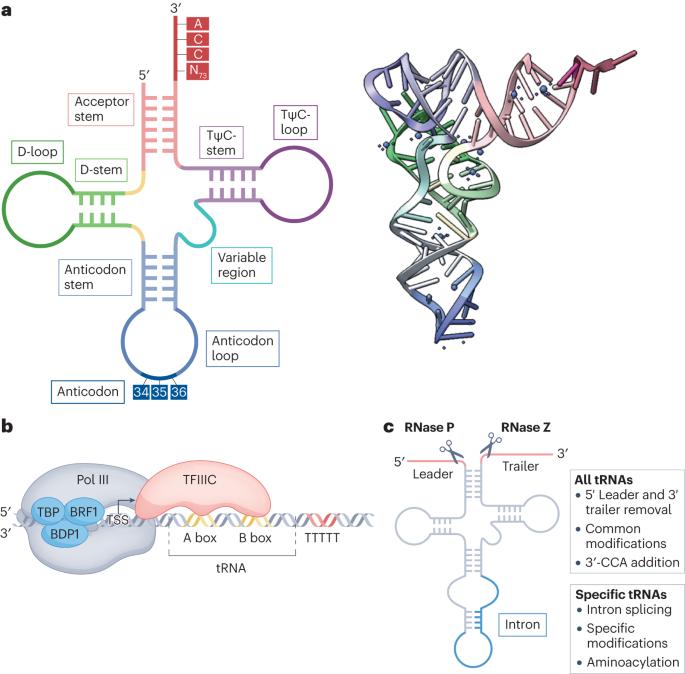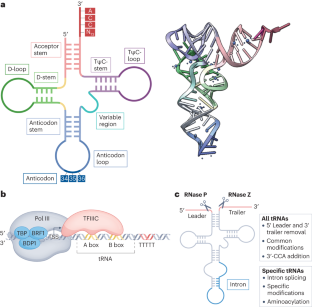Transfer RNAs as dynamic and critical regulators of cancer progression
IF 72.5
1区 医学
Q1 ONCOLOGY
引用次数: 0
Abstract
Transfer RNAs (tRNAs) have been historically viewed as non-dynamic adaptors that decode the genetic code into proteins. Recent work has uncovered dynamic regulatory roles for these fascinating molecules. Advances in tRNA detection methods have revealed that specific tRNAs can become modulated upon DNA copy number and chromatin alterations and can also be perturbed by oncogenic signalling and transcriptional regulators in cancer cells or the tumour microenvironment. Such alterations in the levels of specific tRNAs have been shown to causally impact cancer progression, including metastasis. Moreover, sequencing methods have identified tRNA-derived small RNAs that influence various aspects of cancer progression, such as cell proliferation and invasion, and could serve as diagnostic and prognostic biomarkers or putative therapeutic targets in various cancers. Finally, there is accumulating evidence, including from genetic models, that specific tRNA synthetases — the enzymes responsible for charging tRNAs with amino acids — can either promote or suppress tumour formation. In this Review, we provide an overview of how deregulation of tRNAs influences cancer formation and progression. Transfer RNAs have long been known as static adaptors that translate the genetic code but are now emerging as dynamic regulators in health and disease, including cancer. This Review discusses how the deregulation of the tRNA pool, tRNA-derived small RNAs and tRNA synthetases impacts tumour initiation and progression.


转移RNA作为癌症进展的动态和关键调节因子。
转移RNA(tRNA)历来被视为将遗传密码解码为蛋白质的非动态适配器。最近的工作揭示了这些迷人分子的动态调节作用。tRNA检测方法的进展表明,在癌症细胞或肿瘤微环境中,特异性tRNA可以被DNA拷贝数和染色质改变所调节,也可以被致癌信号和转录调节因子所干扰。这种特定tRNA水平的改变已被证明会对癌症的进展(包括转移)产生因果影响。此外,测序方法已经鉴定了tRNA衍生的小RNA,其影响癌症进展的各个方面,如细胞增殖和侵袭,并可作为各种癌症的诊断和预后生物标志物或推定的治疗靶点。最后,包括遗传模型在内的越来越多的证据表明,特定的tRNA合成酶——负责向tRNA充电氨基酸的酶——可以促进或抑制肿瘤的形成。在这篇综述中,我们概述了tRNA的放松管制如何影响癌症的形成和进展。
本文章由计算机程序翻译,如有差异,请以英文原文为准。
求助全文
约1分钟内获得全文
求助全文
来源期刊

Nature Reviews Cancer
医学-肿瘤学
CiteScore
111.90
自引率
0.40%
发文量
97
审稿时长
6-12 weeks
期刊介绍:
Nature Reviews Cancer, a part of the Nature Reviews portfolio of journals, aims to be the premier source of reviews and commentaries for the scientific communities it serves. The correct abbreviation for abstracting and indexing purposes is Nat. Rev. Cancer. The international standard serial numbers (ISSN) for Nature Reviews Cancer are 1474-175X (print) and 1474-1768 (online). Unlike other journals, Nature Reviews Cancer does not have an external editorial board. Instead, all editorial decisions are made by a team of full-time professional editors who are PhD-level scientists. The journal publishes Research Highlights, Comments, Reviews, and Perspectives relevant to cancer researchers, ensuring that the articles reach the widest possible audience due to their broad scope.
 求助内容:
求助内容: 应助结果提醒方式:
应助结果提醒方式:


